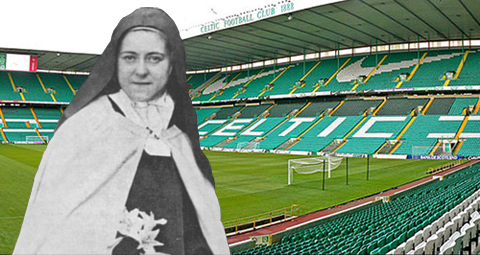July 20 | ![]() 0 COMMENTS
0 COMMENTS ![]() print
print

A period poverty campaign victory inspired by St Thérèse
Erin Slaven writes on how a saint's example led Celtic FC to provide women with free sanitary products
It would be silly to claim that I am the only Catholic with a devotion to St Thérèse. The Little Flower of Jesus is widely adored within our Faith—and beyond. After reading her autobiographical writings, I couldn’t help but feel that I could almost relate to her. I don’t mean that I am as saintly as her (far from it!) but instead I could relate to her little ways and behaviours.
She spoke of how she used to like her hand being taken by her sister, who would guide her along the path whilst she would have her eyes closed. Closing your eyes, feeling the wind on your face and not having to worry about what is going on round about you are some of the reasons why I used to—and still do!—love doing the same thing.
Her appreciation for all the little gifts from God in nature, her close bond with her father; there was so much I could relate to. I was totally inspired by her approach to life, the value she placed on her family and her Faith as well as her relentless patience.
Reading St Thérèse’s autobiography is where the foundations of my devotion began, and she continues to inspire me daily—particularly during this special stage of my life.
I am a politics student and I always like to stay up-to-date with what’s happening in our country and beyond. There is a lot of injustice and oppression, and I think this can put people off engaging with activism and making change. But we can’t be complacent. With this in mind, myself and my two friends, Orlaith Duffy and Mikaela McKinley, began our own campaign based on the increase in discourse around ‘period poverty.’
A survey released in May suggested that 1 in 10 women between 14 and 21 years of age had been unable to afford sanitary products.
There is already work going on in parliament by Monica Lennon MSP which is focusing on making period products free of charge, primarily in schools, universities and colleges, and this work is absolutely invaluable.
However, we felt that social inclusion was just as important. So, being massive football fans, we took the concept of free period product provision to our own team: Celtic FC. Around eight weeks after the campaign started, Celtic agreed to make period products free to access at their stadium from the start of this coming season.
Although the campaign was relatively short lived, I can’t say it was easy! It certainly wasn’t until after it was over I realised how much St Thérèse’s ‘little ways’ had influenced my dealing with it.
There was a lot of backlash around why we started this and what our intentions were. It got really personal at times and sometimes I really struggled to understand why not everybody agreed with us on this. It felt like common sense!
St Thérèse referred often to The Imitation of Christ, and I have often found solace in her references to this. ‘It is more profitable… to leave every man his own opinion than to take part in quarrelsome talk,’ was a particularly poignant comfort to me whilst the campaign was in full swing.
I wanted to be able to get absolutely everybody on board, but it just wasn’t possible. Knowing that St Thérèse read this part of the Imitation and identified with it offered me great comfort in knowing that she had faced similar situations. I refused to engage in any sort of ‘quarrelsome talk’ from the start to the end of the campaign. The focus was on patience, education and peace.
The reason I just could not understand why people were conflicted over this is because it felt absolutely like a matter of dignity. We were often asked, ‘If you can afford a football ticket, surely you can afford a tampon?’ but I knew that there were young women and girls there who hadn’t paid for their own ticket, who were there as guests of charity.
We also spoke to women who had to leave football games early as their period came unexpectedly. It seemed to be quite a frequent occurrence that women and girls were caught short in football grounds, having to leave the fixture early or watch it in discomfort. This just felt like an absolute injustice to me, especially with toilet roll, soap and other essentials being free.
It was this empathy for other women that lead to this campaign’s creation, and I can absolutely say it was done with love.
St Thérèse’s perhaps most famous statement is of her realisation that ‘without love, even the most brilliant deeds count for nothing.’ I am hoping, then, that this deed counted for something.










